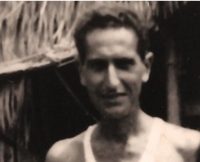Very nasty air raids on Saturday and Sunday — that’s to say, since Manila was declared an “open city”. On Saturday the alert lasted over three hours and during this time the planes, in waves of eight or nine, bombed the piers, the ships in the bay and the boats anchored in the Pasig. The latter proved difficult targets; several bombs missed and exploded in the Old Town, Intramuros, setting fire to a church (Santo Domingo) and a convent. The same thing happened the next day. Fortunately the wind was blowing in the right direction and the fires burnt
themselves out on the eastern ramparts instead of spreading throughout the Old Town as might have been feared. On Saturday evening, people came back from the Old Town excited by their long and agonizing wait in makeshift shelters and still shocked by the explosions. Everyone has their own little story to tell and they don’t stop till everyone else has heard it.
The army, artillery included, has completely evacuated Manila, so much so that planes can fly very low and do as they please. Since yesterday evening, the blackout has been stopped — even during an air raid warning, lights can be left on. Nevertheless, everyone is careful and despite the orders given over the radio, people are almost afraid to turn on the lights.
Yesterday the planes flew very low and the sound of the engines overhead, as we were having lunch, was hardly
reassuring. People’s nerves are on edge. One lady in the hotel has sharply reproached me for not taking shelter in the bar: my presence on the veranda could apparently attract a burst of machine-gun fire onto our building!
The bay looks like a ships’ graveyard. Here and there masts and funnels stick out of the water. Far off a boat burned all day yesterday, having been set on fire by the Americans. In the Pasig, the small inter-island craft have almost all been sunk by the port authorities. They had been ordered to escape to the bay, but for one reason or another either couldn’t or wouldn’t carry out the order. The authorities sank them. But the Pasig is so shallow
that the upper part of the vessels remained above water and risked becoming targets or a pretext for attack by enemy planes. So these stranded ships, too, had to be set on fire.
Yesterday evening, a walk along the boulevard, with a delicious breeze coming in from the sea; fires more or less everywhere — in Cavite still, around the pier area and near the Walled City.
This morning, shopping in town with A.B. [Anne Balfour]. Not many people around, very few cars. On the whole, people are calm despite the near certainty of an air raid at midday. The shops are still full of goods — even the grocery stores and vegetable sellers. Food is just as plentiful as before the war.
Yesterday I met a major I had known in Baguio — he had managed to escape from the town in extremis, sleeping in the open at night and swimming across rivers. Very pleased with this unexpected adventure.
